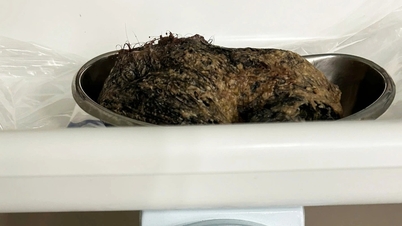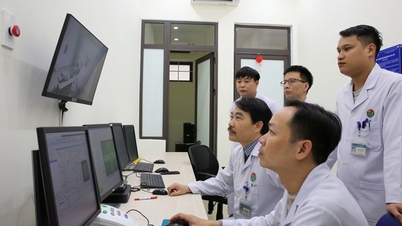
Health education and communication programs are being implemented in the community - Photo: BSCC
This delay can lead to serious complications: from tooth loss, jawbone damage, facial infection, impaired chewing function, reduced quality of life, and increased treatment costs later on.
So why do Vietnamese people delay dental treatment? According to dentists, based on their experience in medical practice, they have observed the following five basic reasons:
Reason 1: Insufficient knowledge about oral diseases and the importance of early treatment; limited understanding of oral diseases and their progression.
One root cause is that people lack sufficient knowledge about the progression of oral diseases: their causes, the consequences of neglecting them, how to treat them, and the benefits of early treatment. Oral diseases such as cavities, gingivitis, and periodontitis can begin silently, initially with plaque buildup and mild gum bleeding… and if left untreated, they can progress to deeper tissue damage, tooth loss, and infection.
Surveys in many countries also show that a lack of understanding among the public, which exacerbates the problem when the disease is already severe, is one of the reasons for delaying treatment.
One rather dangerous misconception, especially among older adults, is that tooth loss, toothaches, enamel erosion, gingivitis, etc., are seen as "unavoidable signs of aging"—which reduces motivation for intervention and treatment.
Reason 2: Treatment costs and financial barriers; dental expenses are often high relative to income.
A major barrier that makes people hesitate to seek treatment is the cost of dental care – especially in cities where the cost of living is already high. For low-income groups, the cost of dental treatment easily becomes a "non-priority medical expense" compared to other basic needs (food, housing, education, and other medications).
Although specific studies on dental costs in Vietnam rarely analyze the reasons for delay in accessing services in detail, from practical experience and surveys of dental services, cost remains a major barrier to accessing oral health services.
In Vietnam, health insurance and medical assistance programs primarily focus on common internal medicine and surgery. Dental services, especially specialized or high-tech treatments, are often not covered by insurance or only partially covered. This leaves patients entirely or largely responsible for paying the costs, increasing reluctance and delaying treatment.
Reason 3: Fear of pain and anxiety about dental procedures.
For many people, going to the dentist evokes feelings of apprehension: fear of pain, fear of prolonged treatment, fear of complications, and fear of additional costs (supplementary treatments). This mindset is a very common barrier in dentistry, not only in Vietnam but also worldwide .
An individual who has experienced pain during past dental fillings, extractions, or cleanings may retain the memory and become traumatized, thus avoiding future visits. Even with improved technology (anesthesia, sedation, painless techniques, etc.), patients may still distrust or doubt the effectiveness of pain relief.
Reason 4: The distribution of dental services is uneven.

The team of dentists and dental assistants conducts a dental examination with the support of modern equipment - Photo: BSCC
A very clear obstacle is that high-quality, state-of-the-art dental facilities are concentrated in major cities, while rural and remote areas lack specialists and equipment.
In hard-to-reach areas, people often have to travel long distances to major cities for medical care, resulting in high costs and travel time. At the primary healthcare level (health stations, commune health centers), specialized dental services are often inadequately equipped; sometimes there are no dentists, specialized tools, or the capacity to perform X-rays, advanced periodontal treatments, or implants.
Reason 5: Cultural influence and word-of-mouth.
The notion that "minor illnesses can be self-treated" or "folk remedies can relieve pain" is deeply ingrained in our way of life. The mentality of "self-treatment," "self-healing," or using folk remedies is widespread among the population of our country.
When experiencing toothache, cavities, or swollen gums, many people try home remedies such as: gargling with salt water, betel leaf water, or ginger wine; taking antibiotics or over-the-counter painkillers; and using folk remedies passed down through generations (applying garlic, lemon, betel leaves, etc.), thus delaying seeing a doctor.
What do you need to do to maintain good oral health?
To address the five issues above, according to Professor Vo Truong Nhu Ngoc - Deputy Director of the Institute of Dental and Maxillofacial Training (Hanoi Medical University), the following is needed:
1. Strengthen community education: Improve understanding of oral diseases and the benefits of early treatment through schools, media, and primary healthcare.
2. Reduce financial barriers: Increase cost transparency, expand dental insurance coverage, and develop various dental insurance packages.
3. Reducing dental fear: Applying painless technology, creating a friendly environment, and providing clear explanations to put patients at ease.
4. Expanding service access: Developing satellite dental clinics, mobile dental services, and remote consultations to serve even remote areas.
5. Change self-treatment habits: Intensify communication and promotion of evidence-based preventive and treatment measures, using "real stories" to encourage regular dental check-ups.
Source: https://tuoitre.vn/ban-co-biet-nam-ly-do-khien-nguoi-viet-ngai-den-nha-si-kham-rang-20251021080544436.htm


![[Photo] Two flights successfully landed and took off at Long Thanh Airport.](/_next/image?url=https%3A%2F%2Fvphoto.vietnam.vn%2Fthumb%2F1200x675%2Fvietnam%2Fresource%2FIMAGE%2F2025%2F12%2F15%2F1765808718882_ndo_br_img-8897-resize-5807-jpg.webp&w=3840&q=75)








































































































Comment (0)